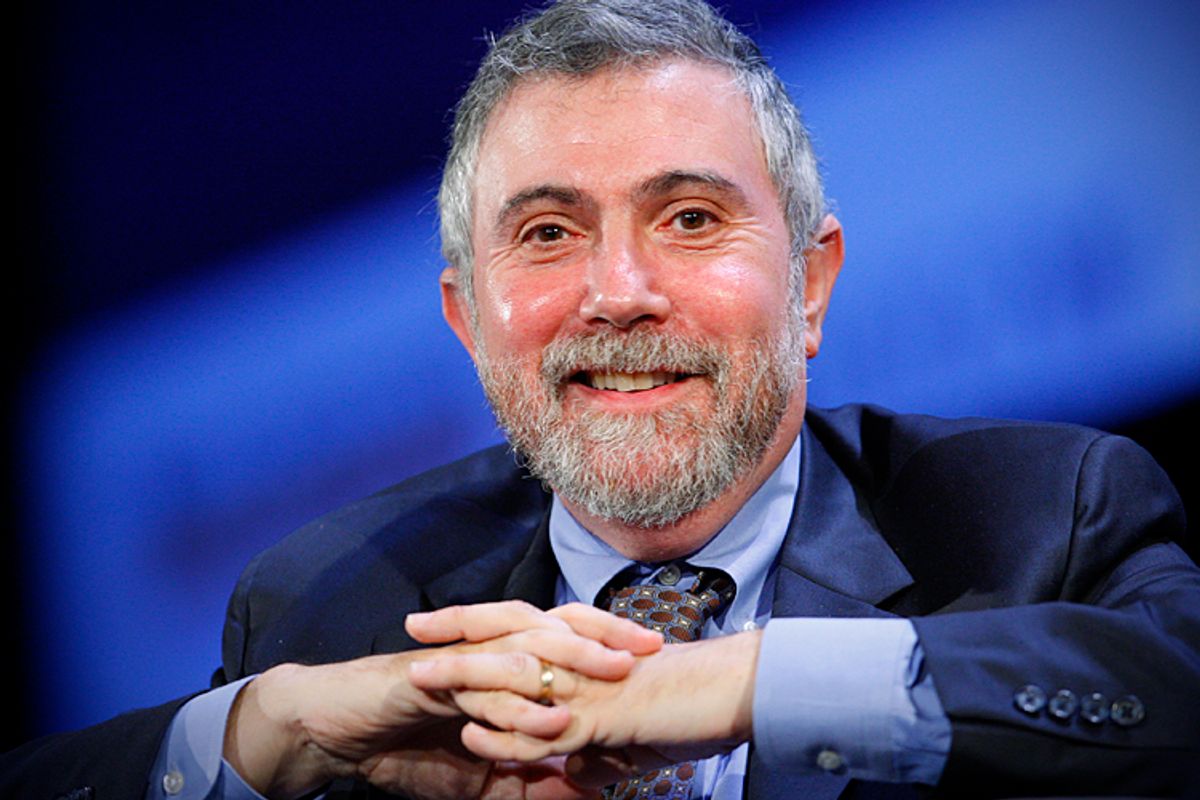From his perch as a New York Times columnist, Nobel Prize-winning economist Paul Krugman has often proven a thorn in President Barack Obama’s left side. So Krugman naturally generated buzz with his new Rolling Stone essay “In Defense of Obama,” a lengthy look at the president's policy record and legacy.
Krugman’s conclusion? “This is what a successful presidency looks like,” he declares.
Obama may not have delivered every progressive goal, but his track record is nonetheless a solid one, Krugman argues. On health reform, Krugman writes that he and many other liberals would have liked to see a single-payer option, but politically, that “wasn’t on the table." Despite its shortcomings, the Affordable Care Act has delivered health care to about 10 million new people and, the economist contends, is helping to slow the growth of health costs.
Similarly, Krugman posits that while the administration has avoided the “drastic crackdown on Wall Street abuses” that it should have pursued, the 2010 Dodd-Frank financial reform law is going a long way toward creating a system of oversight and consumer protection. With both financial reform and climate change, he writes, "acknowledging the inadequacy of what has been done doesn't mean that nothing has been achieved.” On the latter issue, Krugman lauds the administration’s investment in renewable energy, its implementation of enhanced fuel efficiency standards, and EPA climate regulations.
Meanwhile, Krugman gives two-and-a-half cheers for Obama’s handling of the economy. The recovery has been slow, he acknowledges, but the expert consensus is that the administration’s stimulus plan saved the economy from further job losses. The stimulus “should have been both bigger and longer,” Krugman writes, but he argues that the degree to which Obama could have halted the political drift toward austerity isn’t clear; Krugman has harsh words for the GOP and its role in catalyzing it. His ultimate analysis is that Obama did what he could to help the economy, avoiding the disastrous turn of events that played out in austerity-mad Europe.
The common thread running through Krugman’s analysis – the notion that Obama has done at least nearly as much as is politically feasible, that an obstructionist GOP has hindered further progress, and that liberals shouldn’t let the perfect be the enemy of the good – is hardly new.
What’s particularly striking in the piece, though, is a nugget in which Krugman speculates about what may have helped achieve the gains that Obama has overseen. As Krugman observes, the Obama era has witnessed a transformation in the national debate on social issues like reproductive rights and marriage equality. Whereas Democrats cowered on these issues a decade ago, they’re now on the offense, and even if Obama was painfully slow to embrace causes like equal marriage, he’s presided over the party through that fightback. Krugman contrasts this newly assertive posture with Democrats' former "reflexive cringe."
How does this connect to the other policy areas Krugman discusses? “[T]he end of the cringe also, I’d argue, helped empower [Democrats] to seek real change on substantive issues from health reform to the environment,” he writes. Perhaps there’s some truth to that – it may have been particularly true in the heady early months of 2009 – but the theory has its limitations. On the Affordable Care Act, for instance, many Democratic candidates still haven’t figured out how to rebut conservative misinformation about the law. Look at Kentucky, to cite one example, where Brian Beutler notes that Alison Lundergan Grimes hasn’t effectively pushed back against Sen. Mitch McConnell’s distortions on health reform – despite the law’s incredible success in the state.
Moreover, many Democrats – Obama included – are still in a “reflexive cringe” when it comes to the debt and deficit panic peddled by conservative Republicans and Beltway centrists. Krugman writes in Rolling Stone that it’s debatable how much responsibility Obama bears for the country’s austerian turn, but Krugman minced no words in 2011, when the president embarked on an ill-fated search for a “grand bargain” of spending cuts, "tax reform," and social insurance cuts to convince Republicans to raise the debt limit. At the time, Krugman called it an “abject surrender.”
As Krugman makes clear in his discussion of social issues, political figures can help shift the terms of debate on key issues. Since the Republican takeover of the House, however, Obama has too often surrendered to the GOP’s terms. He’s unlikely to change course if confronted with a unified GOP Congress in January 2015.
The cringe, it turns out, hasn’t completely ended.

Shares